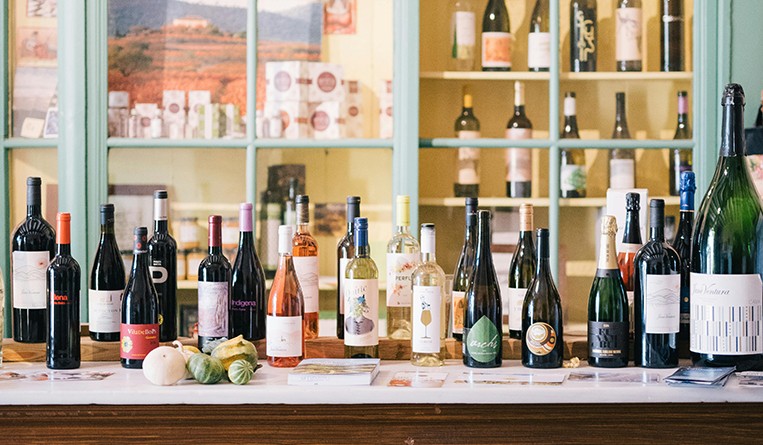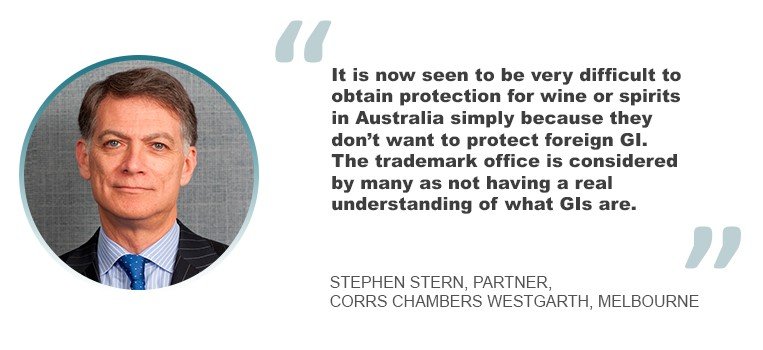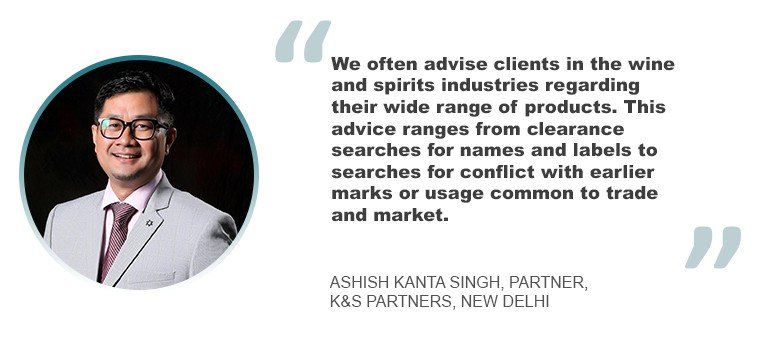How IP is shaping the future of wines and spirits
30 April 2024

Across different jurisdictions, the protection of wine and spirit products involves navigating complex legal landscapes and challenges. Excel V. Dyquiangco discusseshow legal frameworks are adapting to accommodate emerging trends and combat counterfeiting.
The tradition of raising and clinking our glasses during celebrations is a sign of good faith. Beyond this long-held social custom and the aroma of fine wines and spirits lies a complex web of legal intricacies often overlooked. From the meticulous craftsmanship of vineyards and distilleries to the distinctive branding and labelling on each bottle, intellectual property plays a vital role in safeguarding these libations.
In Australia, protecting wines and spirits isn’t much different from other products and systems, except for how legislation allows relevant parties to object. For instance, if someone tries to register a geographical indication (GI) such as Cognac or Burgundy as a trademark, it can be opposed because these names indicate a region where wines or spirits originate.
Similarly, in Malaysia, trademarks serve as crucial identifiers in the wine and spirits industry, helping consumers distinguish products with their distinctive symbols. This includes brand names, logos, slogans and other distinctive elements that set a wine or spirit product apart from others in the market. Licensing of trademarks is also common practice, allowing the use of brand elements by authorized entities.
In neighbouring Singapore, the law works largely the same way; trademarks protect the names and logos associated with wine or spirit brands, GI law protects products produced from certain regions, and the Industrial Designs Law protects the bottle design. In addition, collective marks protect the products made by an association of producers, and certification marks may also be registered to distinguish products with specific qualities.
In comparison, India’s Trademarks Act, 1999 does not specifically address the protection of brands for wines and spirits separately. Instead, it offers broad protection for inherently registrable marks and does not conflict with earlier marks on the register. The act also protects well-known marks, providing defence against both similar and dissimilar goods or services. Further, the Trade Marks Rules, 2017 provide for the listing of a mark as well-known. To do so, the applicant must provide a statement and documentary evidence proving the mark’s fame and reputation of the mark internationally and in India.
Difficulty in obtaining protection

“There are some significant challenges in Australiain the wine and spirit field, as well as in otherrelated fields,” said Stephen Stern, a partner at Corrs Chambers Westgarth in Melbourne. “It is now seen to be very difficult to obtain protectionfor wine or spirits simply because they don’t want to protect foreign geographical indications. The trademark office is considered by many as not having a real understanding of what geographical indications are; it’s a question of regional names, and in quite a few decisions over the last three or four yearsin Australia, organizations have shown a very significant reluctanceto protect any foreigngeographical indicationfor wines or spirits or other products.”
He added: “The problem is that there’s no such thing as an owner of a geographical indication. No one owns a name. You can use it if you produce products from that region and comply with the laws, but you don’t own it. The concept was just not completely misinformed.”
Stern also pointed out the challenge of registering GI for multiple goods, such as clothing, bags and games, all of which fall under different trademark classes, further complicating the process. Because of this, he says, Australia might not implement a GI for protecting wines and spirits. “Well, at least for the moment,” he said.
In Thailand, Panisa Suwanmatajarn, managing partner at The Legal in Bangkok, echoed similar concerns about enforcing IP rights across borders, outlining various challenges faced in this regard.
- Jurisdictional complexities: Navigating diverse legal systems and jurisdictions complicates the enforcement of intellectual property rights. Coordination among authorities across countries becomes intricate and time-consuming.
- Lack of uniformity: Variations in intellectual property laws and enforcement mechanisms between countries hinder consistent protection. Discrepancies in legal standards and interpretations create obstacles in ensuring cross-border enforcement.
- Persistent counterfeiting and piracy: Challenges persist due to the production of counterfeit goods in one country and their distribution across multiple jurisdictions. Tracking and halting such illicit activities becomes daunting.
- Resource constraints: Limited resources, including staff, funds and technological capabilities within enforcement agencies, hamper effective monitoring and enforcement of intellectual property rights.
- Transnational nature of infringement: Intellectual property infringement involves complex transnational networks and organized crime, demanding international cooperation and information sharing for identification and prosecution.
- Border control struggles: Strengthening border control against counterfeit goods encounters hurdles due to resource limitations and the enormity of international trade, making it difficult to detect and seize infringing products effectively.
- Disparities in legal remedies: Varying civil and criminal enforcement procedures, penalties and damages across countries impact the enforcement of intellectual property rights.
To mitigate these challenges in Thailand, Suwanmatajarn listed several legal strategies and mechanisms that can be employed:
- International cooperation: Bolstering collaboration through bilateral or multilateral agreements fosters joint investigations, information sharing and coordinated enforcement actions.
- Capacity building: Invest in training enforcement agencies, customs officials and judiciary personnel on intellectual property laws, investigation techniques and evidence collection.
- Border control measures: Implement robust customs measures, including improved technology and risk-based inspections, to intercept and prevent the movement of infringing goods across borders.
- Public awareness: Educate consumers and stakeholders about intellectual property rights and the risks associated with counterfeit products to reduce demand and discourage infringement.
- Enhanced enforcement tools: Continuously update enforcement tools, employ modern investigative techniques and establish specialized enforcement units to improve effectiveness.
- Collaboration with rights holders: Forge partnerships between enforcement agencies and rights holders for intelligence sharing and joint enforcement actions.
- Legislative update: Regularly update intellectual property laws to align with international standards and introduce provisions for enhanced penalties and streamlined procedures.

“By collaborating closely with intellectual property lawyers, wine and spirits businesses can navigate the intricate landscape of IP protection,” she said. “This ensures the preservation of their distinctive processes, bottle designs, and other unique elements, securing their position in the Asia-Pacific market.”
Timelines and transhipments
While border enforcement measures are available in Singapore, the application of the same imposes rather tight timelines on plaintiff right owners. Marcus Liu, an associate director at Amica Law in Singapore, highlighted the stringent timelines and complexities involved in initiating border enforcement measures in the country.
“For example, to initiate border enforcement measures in Singapore, rights owners are required to prepare a notice to the Director-General of Customs to seize the goods,” he explained. “Once the goods are seized, infringement proceedings must be commenced within 10 days, extendable by 10 days. The rights owner may also be required to pay upfront fees and provide a deposit as security for detaining the goods in question.”
Singapore’s status as the largest transhipment port in the world also adds another layer of difficulty. Liu noted that transhipments of infringing products present challenges in identifying the proper defendant, potentially resulting in significant costs for rights holders.
Liu explained that in cases involving transhipment, infringing products may be seized from third-party freight forwarders or transhippers, complicating the identification of the proper defendant. While the law provides mechanisms for addressing such situations, the costs for detaining, storing and destroying infringing products can be substantial, especially if dealing with large quantities and specialist facilities are required. Further, these costs may ultimately fall on the plaintiff rights holder instead of the transhipper.

“It is therefore important to have reliable legal partners that have a good working relationship with local customs and border enforcement authorities, such as to facilitate the smooth detention of infringing products and prosecution of enforcement measures,” said Liu.
In Malaysia, preventing unauthorized use or imitation is ensured through the Geographical Act 2022, which came into force in March 2022.

“GIs play a pivotal role in branding and establishing trust for certain goods,” said Carmen Wong, a director and founder at Venture Intellectual Property in Kuala Lumpur. “GIs serve as a hallmark, identifying the specific country, region or area of origin and bestowing a reputation upon the associated products. Some wines and spirits are associated with specific regions. This association often signifies a unique combination of natural factors and traditional practices that contribute to the product’s distinct characteristics.”
Wine regions, such as Bordeaux and Champagne, for example, have protected names. This safeguards the origin and quality of the wine, while also building trust and loyalty among consumers as a powerful asset, she noted.
In addition, Wong also emphasized the importance of participating in international agreements like the Agreement on Trade-Related Aspects of Intellectual Property Rights (TRIPS) for protecting GIs worldwide. Encouraging mutual recognition agreements between countries can also further enhance GI protection across borders. Additionally, regional initiatives and cooperation with neighbouring countries are vital for strengthening GI protection in the Asia-Pacific region.
“Indeed, the Intellectual Property Corporation of Malaysia (MyIPO) plays a pivotal role in promoting awareness among consumers, producers and stakeholders about the significance of GIs and the consequences of unauthorized use can contribute to the protection of GI in the wine and spirits industry in Malaysia,” she said.
IP laws evolving
With the projected growth of the wine and spirits market, IP laws in many jurisdictions are evolving to accommodate emerging trends, technological advancements and the unique challenges posed by counterfeiting and unauthorized production. In India, it is with trademarks, GIs and border enforcement.
“The Trade Mark Rules introduced the procedure of listing a trademark as a well-known mark in India,” said Ashish Kanta Singh, a partner at K&S Partners in New Delhi. “The advantage of this development is two-fold. This will help prevent the registration of identical or similar marks in the future by third parties. We have even seen instances where the Trade Marks Office objected to such applications by third parties based on a mark, which is included in the list of well-known marks maintained by the Trade Marks Office, and the right holders of the famous marks are encouraged to act against third party usurpations of their rights.”
India’s legal jurisprudence is evolving to protect terms evocative of GIs. Courts have intervened to restrain the registration and use of brands containing terms indicative of specific geographical origins, such as Gaelic words like glen and ben in relation to whisky, signalling protection for registered GIs like Scotch whisky.
The Indian government has also further strengthened IP enforcement at the border through the Intellectual Property Rights (Imported Goods) Enforcement Rules, 2007, which came into force in May 2007. These rules enable right holders to register their IP rights with the customs authorities. Once the customs registration is granted, importing allegedly infringing goods into India shall be deemed prohibited under Section 11 of the Customs Act, 1962. Currently, the custom recordation is restricted to imports only, according to Singh.
He said courts in India have also stopped defendants from selling products with bottles recycled from another manufacturer. In a case from March 2022, the Delhi High Court stopped defendants from using recycled bottles marked with Budweiser. Even though the defendants had their own labels, the court said using bottles with another manufacturer’s trademark could confuse people about the source.

“We, as IP lawyers, often advise clients in the wine and spirits industries in respect of their wide range of products. This advice ranges from clearance search for names, labels, opining on the registrability of a trademark or label from the point of view of inherent registrability or for conflict with earlier marks or usage common to trade and market,” Singh said. “Lawyers also advise clients on protectability of a unique bottle design and assessing the best medium to protect such design or shapes, i.e. whether as an industrial design under the Designs Act or a shape mark under the Trade Marks Act, 1999.”






